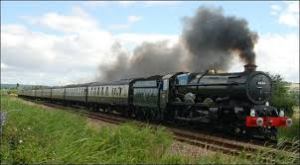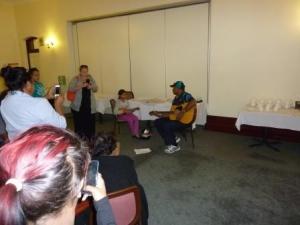
Today, we look at the fourth and final verse of the Dieri translation of Johnny Cash’s song Folsom Prison Blues (for the first verse go here, for the second verse go here and for the third verse go here). In English, the fourth verse reads like this:
Well if they freed me from this prison
If that railroad line was mine
I bet I’d move on over
A little further down the line
Far from Folson Prison
That’s where I want to stay
And I’d let that lonesome whistle
Blow my blues away
As usual, we have had to adapt the Dieri translation so that the words could fit the melody, so here is the fourth verse in Dieri:
Thanali jaila wirlpangankarnanhi
Nganhi nhurru marla wapayi
Trainali nganha pardakayi
Nguraya warrithaya
Folsom Prisonandru waparna
Ngurra ngamalha nganayi
Ya trainaya wirlpinali
Matya nganha manyungankayi
Translated into English this means:
If they open the jail
I would go very quickly
The train would take me
To a home far away
Going from Folsom Prison
I will always stay
And the train’s whistle
Would make me feel better
The words and their meanings are the following:
thanali means ‘they’ referring to three or more people. This is the transitive subject form
jaila is the English word ‘jail’ with an a added since Dieri words must all end in a vowel and have two syllables
wirlpangankarnanhi means ‘if (someone) opens’ and consists of the root wirlpa ‘hole, opening’ and the endings -nganka ‘to cause, make’ and -rnanhi meaning ‘event happening at the same time with a different subject’ (the subject of wirlpanganka ‘to open, cause to be open’ is ‘they’ and the subject of the next line is ‘I’)
nganhi means ‘I’. This is the the intransitive subject form
nhurru means ‘quick, fast’
marla means ‘very, more’ and serves to emphasise the previous word here, so ‘very quickly’
wapayi means ‘am going’ and consists of the root wapa ‘to go’ and the ending -yi indicating present tense, a situation happening now
trainali means ‘by the train’ and is the transitive subject form (it consists of the English word ‘train’ (with a added to make it two syllables and ending in a vowel) plus the ending li which marks transitive subject for roots of two syllables ending in a)
nganha means ‘me’ and is the transitive object form (the object of the verb ‘carry’ here)
pardakayi means ‘is carrying’ and consists of the root pardaka ‘to carry’ and the ending -yi indicating present tense, a situation happening now. As we saw in a previous post traditionally pardaka-rna means ‘to carry in the hands’ — here it is extended to the train carrying the singer away inside it
nguraya means ‘to home’ and consists of ngura ‘camp, home’ plus the ending -ya which indicates ‘direction towards a place’ (the technical term for this is the allative case — we will discuss it in more detail in a future post)
warrithaya means ‘to far away’ and consists of warritha ‘far, distant’ plus the ending -ya which indicates ‘direction towards a place’. It modifies the previous word so we have ‘to a home far away’
Folsom Prisonandru means ‘from Folsom Prison’ and uses the English name (with added final a for ‘prison’, as we have seen previously for ‘jail’ and ‘train’) plus the ending -ndru which means ‘from (a place)’ (the technical term for this is the ablative case — we will discuss it in more detail in a future post)
waparna means ‘going’ and consists of the root wapa ‘to go’ and the ending -rna indicating ‘event happening at the same time with a same subject’ (the subject of wapa ‘to go’ is the same as the subject of the next line, namely ‘I’)
ngurra means ‘always’ (be careful to make a clear pronunciation difference between ngurra ‘always’ with a trilled-r sound (like a Scottish r) and ngura ‘camp, home’ with a short flapped-r sound as confusing the two words makes a lot of difference in meaning!)
ngamalha means ‘(will) sit, (will) stay’ and consists of the root ngama ‘to sit, stay, live’ and the ending -lha which indicates future tense (something happening later) in combination with the next word
nganayi indicates a future situation when it follows a verb that ends with the -lha component — it is equivalent to English ‘will’ in ‘will sit’
ya means ‘and’
trainaya means ‘of the train’, and is the possessive form of the word ‘train’ that is borrowed from English (using the ending -ya meaning ‘belonging to, owned by’)
wirlpinali means ‘by the whistle’ and is made up of the root wirlpi ‘to whistle’, the ending -ni which indicates ‘thing that does an action’ and turns verbs into nouns (so wirlpi-ni is used to describe the thing ‘whistle’), and the ending li which marks transitive subject. For nouns of three syllables ending in i like wirlpini, the last vowel changes to a before we add -li (this is also true for root words of three syllables ending in i, so kadnhini ‘mother’s mother’ has the transitive subject form kadnhinali)
matya means ‘already’
nganha means ‘me’ and is the transitive object form (the object of the next word which is the verb ‘make feel good’)
manyungankayi means ‘is making feel good’ and consists of the root manyu ‘good’ and the endings -nganka ‘to cause, to make’ and -yi ‘present tense’
This is the last verse and completes our translation of Johnny Cash’s song.
Note: Many thanks to Greg Wilson and the Port Augusta Dieri Language Committee, especially Aunty Renie Warren, for passing on to me the draft of their song translation






